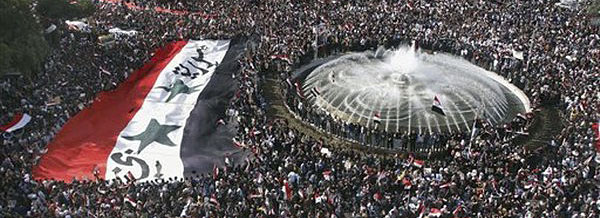“Arab Spring” Spells Death of Tourism in Syria

What Ongoing Unrest in Syria Means For the Travel Industry.
And what is the future of tourism?
Syria has capitalized on its millennia-old history in the past decades using it as a springboard to build a thriving tourism industry that generates about 12 percent of the country’s economy. When the protests started, that tourism industry rapidly ground to halt – within three months it was all but extinct.
How it happened and ”Libya’s model”…a new NATO strategy?
You only need to turn on your TV to discover an information war against the Syrian capital Damascus is being conducted. The world news broadcast news of the current mass strikes and street disturbances anticipating activists will soon capture the city and overthrow the authorities. Then, they say, NATO should become involved and make democracy triumph.
Do these sentiments remind you of anything? In short, yes. In 2011 Libya went through almost the same tensions to establish democracy in the state. Libya illustrates the willingness of the West to become involved in the displacement of regimes in countries that are out of favor with the West.
‘”After Libya, it seems acceptable to attack any country with inner strikes and public disturbances against the current government,” comments Beirut-based political scientist Ismail Al Hamri. Al Hamri doubts the possibility NATO would allow the same measures to be taken over disturbances in London or Greece, but the situation changes in Arabic countries.
After Libya’s Muammar Gaddafi ruled regime was toppled, showdowns in Damascus started…
Writing a prescription for Syria’s revolution.
The world froze in anticipation of Syrian President Bashar al-Assad’s reaction to the uprising and wondered if it would give NATO official reasons to intervene. But the current President doesn’t want to repeat Libya’s story. Hence, what can be prescribed to change the government in Syria?
- Prescription 1; Lessons from Iraq’s invasion.
The invasion of the US army into Iraq was accomplished under the pretext of finding hidden nuclear arsenals. Did Americans find any weapons of mass destruction? No, but a case with a fake pretext could be useful in today’s Syria.
The internet brims with video clips showing Assad’s soldiers allegedly committing violence against civilians, TV networks broadcast news about the situation on Syria’s streets making the public believe that there is no place for dictatorship in the state. However most of the videos loaded to the internet are defined by experts as fakes and with the passing of a few years that will be proven, but their influence on Western perception cannot be underestimated.
- Prescription 2: A paradise for refugees.
Throughout the uprising Turkey repeatedly announced its ability to provide safe haven for refugees fleeing Syria. Long adversaries with their neighbors, Turkey has won support including from sectors in Syria’s influential city of Aleppo. It stands to reason Aleppo could potentially be transformed into a so-called capital of anti-governmental forces with European support including money and weaponry.
- Prescription 3: Discrediting a rival.
The secret intelligence service in Libya surmises NATO may use the situation to fuel its current disagreement with Russia. Russia has an interest in preserving the current regime in Syria as a key political and commercial partner. Syria is a gateway that is crucial to Russia as it seeks to preserve its naval base in Tartus on Syria’s Mediterranean coast.
The other victims – the tourist industry.
The “Arab Spring” in Syria has quickly redrafted the country’s tourist map. Due to current disturbances some countries have closed their embassies in Syria and advise their citizens from visiting the troubled country.
“On February 6 the American Embassy with all the executive staff ceased the working process in Syria due to destabilization of the situation in Syria,” said Victoria Nuland a spokeswoman for the United States Department of State.
The current events in Syria have changed the focus of tourist behavior to more safe countries. Experts conclude over 40 percent of hotels in Syria are on the verge of bankruptcy. Most tourist dollars are now going to Israel, India and neighboring Oman.
“The hotel is totally pre-booked for three months and this is something new for us. I can explain it only as a consequence of the ‘Arab Spring’,” comments Talal Al Arami, assistant manager of Muscat Intercontinental Hotel in Oman.
With the disturbances continuing and with little compromise form the Syrian Government the problem looks to be a protracted one. Increasingly the struggle for democracy has turned Syria into a political football for Western and Eastern interests. Hence, despite the best intentions and sacrifice of those campaigning on the streets the question of democracy in the state has become deeply mired in political manipulation. At the latest UN General Assembly the majority adopted a non-binding resolution to apply pressure on the Syrian President to step down. Russia voted against the motion. While the mechanations continue the question for the tourism industry is can it wait?








What’s the significance from the folds of libya major for ladies? Also, does a more dark color tell the lady is sports?